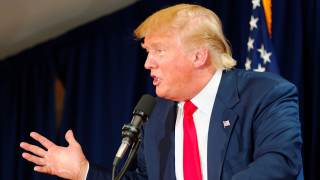Can UK Trump US on Christian freedoms?

The Christian Legal Centre’s Roger Kiska looks at Donald Trump's speech on Religious Freedom Day and asks if the United Kingdom can reclaim its Christian identity and manage to trump Trump.
On January 16 each year, Americans celebrate Religious Freedom Day, commemorating the anniversary (now 232 years ago) when the Virginia State Legislature passed the nation’s first religious freedom statute. Penned by Thomas Jefferson on the coattails of the American Revolution, the bill states that: “all men shall be free to profess, and by argument to maintain, their opinions in matters of religion, and that the same shall in no wise diminish, enlarge, or affect their civil capacities.”
This year, President Donald Trump welcomed the occasion with a proclamation stating that not only are Americans guaranteed the right to believe what they see fit, but they also enjoy the right to freely exercise their faith. In a remarkable statement speaking to the current cultural zeal to limit Christian freedoms (present also here in the United Kingdom), President Trump wrote: “No American -- whether a nun, nurse, baker, or business owner -- should be forced to choose between the tenets of faith or adherence to the law.” He further noted that the continued incursions against free exercise of our faith, little by little, can destroy the fundamental freedom underlying democracy.
The President called out, either explicitly or by inference, government policies which threaten to punish certain forms of religious speech with tax consequences (Trump would be referring to the Johnson Amendment which has been used to suppress speech on things like abortion and same-sex marriage from the pulpit); state laws which punish business owners who cannot in good conscience affirm, through their provision of a goods or services, something which they believe to be sin; policies as non-sensical as requiring nuns to pay for contraceptives despite the Catholic Church’s belief that the use of contraceptives frustrates God’s biological design for procreation (the Little Sisters of the Poor famously challenged the previous administration’s mandate before the U.S. Supreme Court); and “rights” tribunals which attack Christian freedoms (the President’s reference to bakers relates to the Colorado Civil Rights Commission finding against Jack Phillips and Masterpiece Cakeshop for declining to bake a wedding cake for a same-sex ‘marriage’ ceremony).
Here in the United Kingdom, where the contributions and history of Christianity have been the very foundation of all of the freedoms we enjoy today, we would do well to recall that the state of Christian freedoms in this nation is the barometer of how unhealthy our democracy has become. We have our own business owners and service providers before the courts simply for following their consciences. We have our own ways of punishing Christians who express Biblical beliefs that the current cultural zeitgeist finds unpalatable: we arrest them, sack them, remove them from our universities, do not allow them to foster children, run adoption agencies or adopt, we make it impossible for them to be political leaders and in many more ways, both subtle and egregious, we marginalise them.
Perhaps it is time to reflect and strive, like our counterparts in America, and rethink how we wish to treat Christians in the public square. It is time for our leaders to recognise the fundamental importance of this country’s Christian heritage, and to be grateful for the many positive contributions Christians continue to bring to our society today. Perhaps it is time even to embrace some friendly competition and to show President Donald Trump that, in the area of defending Christian freedoms, what he can do, we in the UK can do even better.
